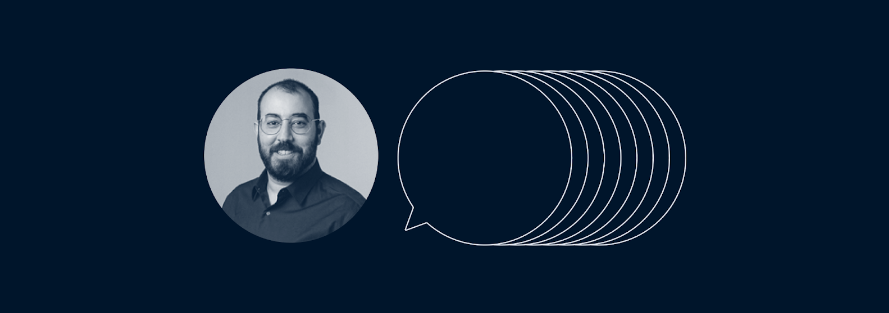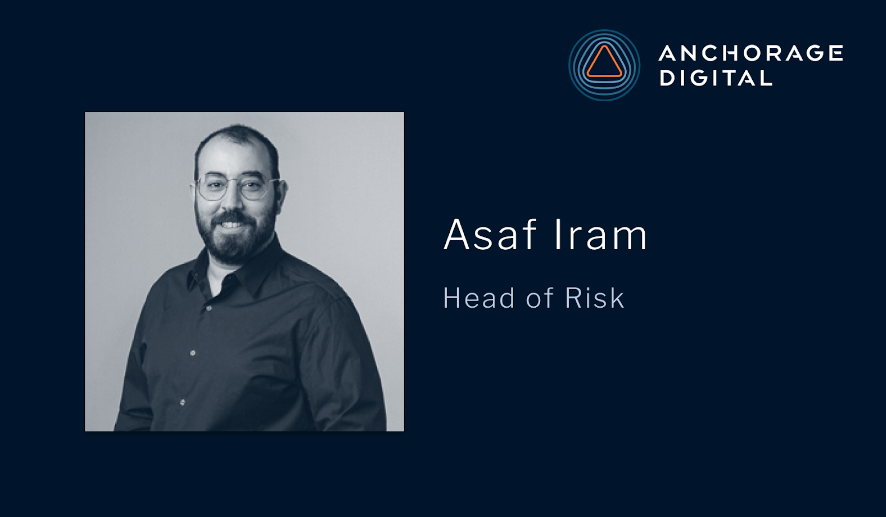Latest news about Bitcoin and all cryptocurrencies. Your daily crypto news habit.

Welcome to Eight Questions, where we profile individual members of the Anchorage Digital team, diving into their career paths, what brought them to crypto, and what makes them tick. Why eight? Because it’s the number of decimal places a bitcoin can be divided into. It’s also the last single digit number in a Fibonacci Sequence, and we like that.
Leslie Ankney
Next in our series, meet Asaf Iram, an expert in risk management and large scale strategies to manage computational and trading systems. Asaf joined Anchorage as Head of Risk in December 2020. He began his career as an options trader and high frequency proprietary trader in Tel Aviv, pivoting to focus full time on crypto in 2017. Prior to Anchorage, Asaf served as Head of Trading at crypto lending platform Celsius Network. Asaf lives in New York with his family.

- You’ve been with Anchorage nearly two years now, what is it about Anchorage that makes you most proud?
The culture, and the fact that you can count on your team make me excited every morning to start working.
Most recently, as the market faced pressure from a drop, I’ve seen our team support each other for the ultimate benefit of our clients. Seeing the coordination, processes, and smoothness of operations between our trading and financing desks makes me feel really proud of our ability to collaborate for the benefit of our clients.
2. What makes you most excited about working in crypto?
What initially got me into crypto was the idea of Innovating within the existing financial system. When I learned about Bitcoin and figured out what it could do, I was simultaneously overwhelmed and excited to move out of my comfort zone professionally.
I still remember only being a few months into working at Anchorage when we received our bank charter from the OCC. I remember telling our CEO, Nathan McCauley, that I would have been thrilled to read this news just as a fan of crypto, but as a member of the industry, and working at the actual company to get the first federal charter, it was 10 times the excitement.
3. Our risk team has grown substantially since you joined, what have been some of the milestones in building the risk processes and team here?
Building the risk team presented a novel challenge for me. I spent time first understanding our business and where we’re headed. Next, I had to get to know our teams. Every person we hire can impact our culture and approach as a team, so it was important then, and it’s still important now to get to know your colleagues and what they bring to the table.
From here, I designed what I wanted the team to be and how it would integrate with other teams, and staffed up the Risk department. We started implementing and training the broader company in risk policies and procedures. Finally, we needed to build trust within our team and with other teams that we work closely with like financing, trading, and data science.
Since day one, I worked on a risk monitoring system that more and more of my team supported. Seeing it go live and be a reliable source of truth for our company has been a career highlight for me. We introduced a credit risk analysis program and I hired key people for the credit risk side of our team. The growth of our team on both the market & credit sides has paralleled Anchorage’s growth over the same period as we’ve helped scale our capabilities.
4. What’s your leadership style? How do you nurture growth and great thinking on your team?
I like open conversations, and a flat leadership style where my team can give me feedback and we can all learn from one another. I want my team to know they have an open line of communication to share their thoughts. That’s how we make sure we’re always improving and innovating as a team. I also want my team to know there’s no stupid questions, and even after you’ve been here a year. Transparency is our key to success.
As for our job as a department, I ask my team to stay as far out of the box in their thinking as possible, because this helps our team stay creative at facing different risks in the crypto market, especially as new financial products and protocols emerge all the time.
5. Tell us about a piece of advice you think is important for leaders to take on.
Sometimes saying the “bad news”, or being the critical voice is necessary. As a leader, you need to help your team think clearly and get processes clear. Sometimes you need to do the tough work that other people don’t want to take on to help your organization be successful.
6. What’s a piece of advice you got from a mentor in your life that you apply in your role at Anchorage?
When I was working at the trading desk in Tel Aviv, all the traders would sit in the same room, but they were aggressive, out for themselves, and never shared their ideas or strategies for trading with others. Everyone was out for themselves. I was fortunate to get invited to a closed room trading desk where things were done differently. Here, everyone worked collaboratively as a team. The leader of that team shared all of his knowledge, ideas, theories, and methods. He had no secrets and believed our success was his success. Usually traders don’t share their intel like this, and I really admired his willingness to share. It taught me that the collective knowledge of a team is more powerful than an individual trader.
7. Tell us about culture shock and settling into New York from Tel Aviv, any tips?
The biggest culture shock was that people actually stand in lines. Everything actually goes smoothly. In Israel, if you just stand in the line, nothing’s going to happen, other people cut in front of you and push their way ahead. You learn if you don’t do that too, you never get what you need. Even to this day, my immediate response to seeing a line is to think: how can I skip it or go faster? I remind myself that here in the U.S., I don’t have to do anything extra to get something done, systems work smoothly, and it brings my stress level down.
The food scene in New York is unbelievable. There are people here from all over the world, every cuisine you can imagine, and it makes newcomers feel welcome no matter how far they are from home. In New York people don’t care who you are, which seems cold, but the fact that no one cares where you are from or how you look allows you to just be yourself, and that feels warm and freeing.
8. How does being a risk manager professionally play into your role as a father?
I have a two year old daughter who is my favorite person in the world. She changed my life. We have another child on the way, it’s a boy and I’m terrified. The responsibility of parenting is endless and there’s always a bit of terror every time we go outside as a family, because kids love risk and you never know what they’re going to do.
As a risk manager, you can only become good at managing risk if you make mistakes, learn from them, and analyze why and how to avoid them in the future. My daughter wants to jump off the couch, stand on the edge of the table, or jump on the bed where she might fall. Letting her take a risk and make mistakes is scary, but then you get a hug and hear Daddy, I love you [אבא, אני אוהבת אותך] in Hebrew, and you know it’s worth it.
This post is intended for informational purposes only. It is not to be construed as and does not constitute an offer to sell or a solicitation of an offer to purchase any securities in Anchor Labs, Inc., or any of its subsidiaries, and should not be relied upon to make any investment decisions. Furthermore, nothing within this announcement is intended to provide tax, legal, or investment advice and its contents should not be construed as a recommendation to buy, sell, or hold any security or digital asset or to engage in any transaction therein.
Eight Questions: Asaf Iram, Head of Risk, Anchorage was originally published in Anchorage Digital on Medium, where people are continuing the conversation by highlighting and responding to this story.
Disclaimer
The views and opinions expressed in this article are solely those of the authors and do not reflect the views of Bitcoin Insider. Every investment and trading move involves risk - this is especially true for cryptocurrencies given their volatility. We strongly advise our readers to conduct their own research when making a decision.